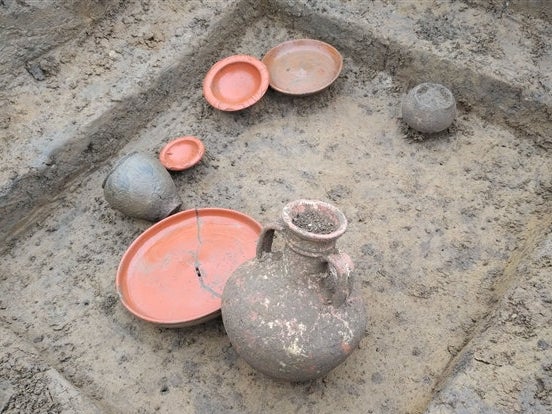Remains of entire Roman town discovered next to A-road in Kent
‘This site changes our understanding of Newington’s development,’ says expert
Your support helps us to tell the story
From reproductive rights to climate change to Big Tech, The Independent is on the ground when the story is developing. Whether it's investigating the financials of Elon Musk's pro-Trump PAC or producing our latest documentary, 'The A Word', which shines a light on the American women fighting for reproductive rights, we know how important it is to parse out the facts from the messaging.
At such a critical moment in US history, we need reporters on the ground. Your donation allows us to keep sending journalists to speak to both sides of the story.
The Independent is trusted by Americans across the entire political spectrum. And unlike many other quality news outlets, we choose not to lock Americans out of our reporting and analysis with paywalls. We believe quality journalism should be available to everyone, paid for by those who can afford it.
Your support makes all the difference.Archaeologists have hailed the discovery of an entire Roman town and main road as “massive” for their understanding of ancient Kentish development.
The 18-acre site featuring Iron Age and Roman settlements contained rare coins, pottery and jewellery dating back as early as 30 BC, and was uncovered next to a major road in Newington, near Sittingbourne.
Evidence of a 7m-wide road was also found, alongside the remains of an ancient temple, close to the A2 – which itself tracks an ancient link with Canterbury and the coast.
Experts have said the discovery is one of the most significant finds made in the region. Newington History Group said that rare iron furnaces and sunken pottery kilns were also found, while several expensive, imported smaller items demonstrated the residents' high status.
Dean Coles, chairman of the group, said: “This is very exciting. The scale of this site, with the huge number and quality of finds, changes our knowledge of Newington’s development.”
A team of 30 archaeologists has worked full-time for eight months on the site.
He added: “We already had evidence of a Roman burial ground and Roman occupation in the immediate vicinity and this excavation shows there was a thriving manufacturing site in the heart of our village.
“The temple and major road are massive discoveries. It proves the A2 wasn’t the only Roman road through the village.
“As a group, we are keen to trace the route and destination of this new ‘highway’ which may have connected with another temple excavated 50 years ago on the outskirts of Newington and a villa unearthed in 1882.”

The buried town was found during the development of 124 new homes.
Once they have analysed their findings and published a report, experts will cover up the ancient remains so the new housing can be completed.
Dr Paul Wilkinson, archaeological director at Swale and Thames Archaeological Survey, said: “This is one of the most important discoveries of a Roman small town in Kent for many years with the preservation of Roman buildings and artefacts exceptional.”
Romans invaded Britain in AD43 and remained for almost 400 years.
Remains of their occupation have been found scattered across the UK, including Hadrian’s Wall in Northumberland and the Roman Baths in Bath.
The discovery comes after an “incredibly rare” Roman-era coin was found in Cambridgeshire, minted during the two-month reign of a breakaway emperor in the third century.
And the chance find of a Celtic shield in a field in Leicestershire has changed experts’ understanding of how ancient Britons fought in wars.

Join our commenting forum
Join thought-provoking conversations, follow other Independent readers and see their replies
Comments